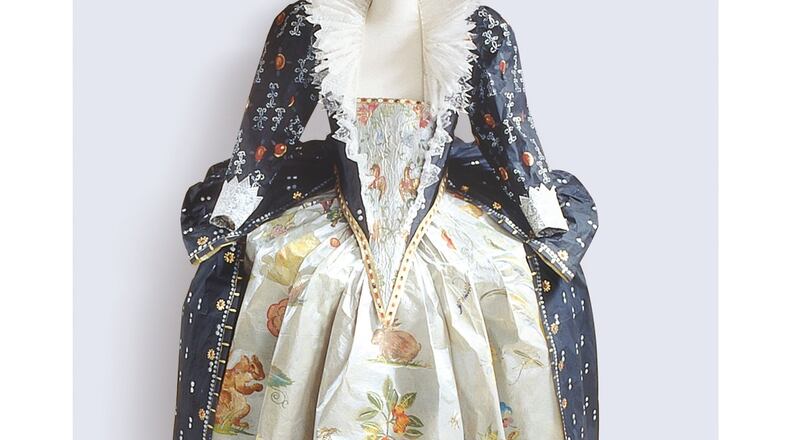Fashion is full of moments of whimsy and fun: Bjork’s Marjan Pejoski swan dress, Mary Quant’s bold 1960s mod creations and the sheer visual excess of sky-high powdered wigs, blush and beauty marks on the aristocratic Macaroni dandy of the 18th century.
Belgian artist Isabelle de Borchgrave taps into a deep vein of quirkiness in her work, which turns ordinary paper into elaborately detailed and often historically accurate trompe l’oeil garments. Shaped into shockingly real imitations of fabric, her sartorial sculptures are an exercise in delicious illusion capable of transporting viewers back to a childhood state of wonder.
Organized by Pittsburgh’s Frick Art Museum, the exhibition “Isabelle de Borchgrave: Fashioning Art From Paper,” at SCAD FASH Museum of Fashion + Film showcases de Borchgrave’s elaborate replicas of historic garb, from the Italian gowns worn in the Medici period to Les Ballet Russes costumes designed for that modernist group’s dancers by artists including Picasso, Jean Cocteau and Giorgio de Chirico. With their intense colors, bizarre hats and designs referencing Middle Eastern and folk motifs, the Ballet Russes collection, separated by a scrim of fringe in the gallery space, shows de Borchgrave’s taste for playfulness and whimsy.
Simple paper, when painted and manipulated, it turns out, can take on the look of a variety of fabrics from silk to taffeta to linen and faithfully imitate delicate Belgian lace or embossed gold jewelry. For her complex creations, de Borchgrave employs materials including the same paper Belgian chocolatiers use to wrap candy and an imported British paper that stands in for gossamer lacework on a cuff or collar. Her technique is one of playful trickery as seen in the crisp, knife-edge pleated gold dress and rich brocade wrap of “Delphos Dress and Coat” (2006-2007) inspired by Spanish fashion designer Mariano Fortuny.
The exhibition is divided into five themes: Splendor of the Medici, Papiers à la Mode, The World of Mariano Fortuny, Kaftans and Les Ballets Russes and also features an insightful video showing de Borchgrave at work in her studio, demonstrating her process. A basket of paper samples allow tactile-curious visitors to satisfy their desire to feel how paper transforms into such an uncanny replica of fabric.
Not all of de Borchgrave’s faux-fashion wows. Her underwhelming “Kaftans” series is set off in three jewel box alcoves separated by thick gold curtains. The series highlights pattern above all with tunics hung flat against the wall, but it lacks the thrill of deception of her three-dimensional garb.
De Borchgrave often finds inspiration for her creations in museums, at New York’s Costume Institute at the Metropolitan Museum of Art, the Musée du Louvre and at London’s Victoria and Albert Museum from which she drew her replica of a 1750 dress typically worn for an appearance at the royal court. “Mantua” (2011), features a skirt as large as a dining room sideboard and emphasizes one of fashion history’s more outlandish moments. Some of de Borchgrave’s fashions are inspired by dresses seen in oil paintings like the one by Francois Boucher of King Louis XV’s mistress Madame de Pompadour featuring a dress festooned with roses and a décolletage of copious ribbons. Because they are imitations of period dresses rather than actual fashions from the time, de Borchgrave’s dresses are often better guidebooks to the unusual techniques, patterns, materials, embellishments and style of their age. Like an illustration in a book, they allow you to focus in on their details.
“Isabelle de Borchgrave: Fashioning Art From Paper”
Through Jan. 12, 2020. 10 a.m.-5 p.m. Tuesdays-Wednesdays and Fridays-Saturdays; 10 a.m.-8 p.m. Thursdays; noon-5 p.m. Sundays. Closed Christmas Day and New Year's Day. $10; $8, senior citizens and military (all active-duty military personnel and their families have free museum admission through Labor Day); $20, family (three or more); $5, college students with ID and SCAD alumni; free, children under 14 and SCAD students/faculty/staff. SCAD FASH, 1600 Peachtree St. NW, Atlanta. 404-253-3132, www.scadfash.org
Bottom line: A Belgian artist’s elaborate historical gowns made of paper delight with their fool-the-eye craftsmanship.
About the Author
Keep Reading
The Latest
Featured


